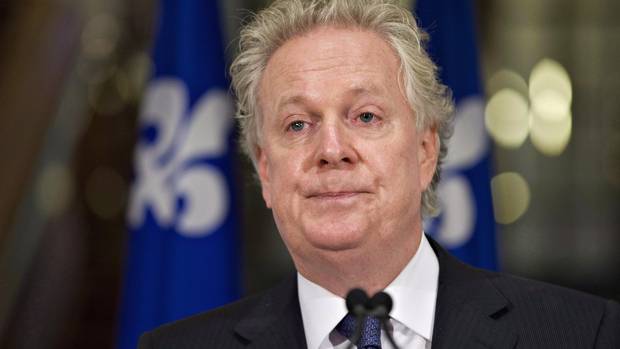Former Quebec premier Jean Charest tried to set up a meeting this year between the Prime Minister’s Office and the promoters of the controversial Energy East pipeline, The Globe and Mail has learned.
However, the PMO said it refused to take the meeting with officials from TransCanada Corp., arguing Mr. Charest’s entreaty did not respect Canada’s lobbying regime.
Mr. Charest has not responded to a series of questions from The Globe over more than two weeks about his recent conversation with Gerald Butts, who is Prime Minister Justin Trudeau’s principal secretary.
Now a partner at a major law firm, Mr. Charest is not registered to lobby the federal government. According to the Lobbying Act, undertaking to “arrange a meeting” in exchange for a payment is one of the actions that can require public registration with the Commissioner of Lobbying.
Based on publicly available information, it remains unclear whether Mr. Charest is paid to promote the Energy East project, or whether he should have registered before calling Mr. Butts.
Both TransCanada and Mr. Charest’s law firm, McCarthy Tétrault, refused to state the nature of the former politician’s involvement in the project, or in which capacity he offered to set up the meeting. It’s also unknown whether TransCanada is a client of McCarthy Tétrault.
The rules and regulations governing lobbying in Canada are designed to bring transparency to the process, with the stated objective of “enhancing public confidence and trust in the integrity, objectivity and impartiality of government decision- making.”
The PMO confirmed that Mr. Charest raised the possibility of organizing a meeting with officials from the Alberta-based company earlier this year.
“Mr. Charest and Mr. Butts had a conversation about a number of things and in the course of the conversation, Mr. Charest asked if Mr. Butts would be willing to take a meeting with TransCanada,” PMO director of communications Kate Purchase said on Tuesday.
“Mr. Butts was clear with Mr. Charest that there are rules and processes for these types of meetings and if they wanted to follow that process, he would be happy to discuss a meeting with TransCanada,” Ms. Purchase added.
Mr. Charest is one of the best known public supporters of the Energy East pipeline, but there had been little information to this point on his efforts to promote the project behind the scenes.
“Our firm policy is that we do not make comments that either confirm or deny a client-relationship or mandate,” McCarthy Tétrault spokeswoman Hélène Sansoucy said.
A spokesman for TransCanada, Tim Duboyce, added the firm had no comment to make in response to The Globe’s questions about Mr. Charest.
According to the federal lobbyist registry, TransCanada officials have communicated in recent months with Conservative MP Bernard Généreux, the chief of staff to the Minister of Natural Resources, as well as senior bureaucrats with the departments of Natural Resources, Global Affairs and the Privy Council Office.
TransCanada has been waging a long campaign to sell its Energy East pipeline to a skeptical public, especially in Quebec, and to the environmental movement at large. If approved, the $15.7-billion pipeline would carry 1.1 million barrels of Alberta oil-sands crude across Canada to refineries in Quebec and New Brunswick.
Mr. Charest was criticized by environmentalists in 2014 for participating in a private meeting in Montreal between a number of provincial politicians, including Quebec Natural Resources Minister Pierre Arcand, and officials from TransCanada.
In a speech in Quebec City in January, Mr. Charest applauded the Trudeau government for creating a more rigorous evaluation process for the project.
“That’s good. Now we need to engage in a reasoned debate and avoid relying solely on impressions,” Mr. Charest said, according to an account in Quebec City’s Le Soleil newspaper. “Just saying ‘no’ is not the answer.”
The Energy East file has posed a number of challenges to the Liberal Party and the Trudeau government in recent months.
While the project is solidly backed by the governments of Alberta and Saskatchewan, as well as the Conservative Party of Canada, it has faced stiff opposition in Quebec and among environmentalists.
The Trudeau government has resisted pressure to act as an Energy East “cheerleader,” instead creating a longer approval process designed to address the concerns of communities on the pipeline’s itinerary and First Nations.
Still, Mr. Trudeau has also ensured that Montreal Mayor Denis Coderre softened his criticism of the proposal. After a private meeting with Mr. Trudeau in January, Mr. Coderre played down his anti-Energy East rhetoric and said he was reassured by the federal government’s new approach to pipeline projects.
Relations between TransCanada and the Liberal Party were rocky during the last election campaign. Less than a week before vote, the co-chair of the Liberal campaign, Dan Gagnier, resigned in the wake of revelations he had recently offered advice to TransCanada on its dealings with the next government.
TransCanada said it hired Mr. Gagnier in the spring of 2015 primarily to guide the firm “on how best to communicate the benefits of the [Energy East] project to Canadians.” His downfall started when he sent a note to officials at the firm about potential scenarios after the Oct. 19 election, including ways to lobby federal officials on its development and pipeline projects. The note was leaked to the media five days before the election.
Mr. Trudeau insisted that Mr. Gagnier was never involved in developing the Liberal Party’s energy policy, but said his adviser “engaged in inappropriate behaviour” by mixing his roles with the party and the company.
A number of senior Liberals at the time of the leak felt that Mr. Gagnier had likely been set up by a political rival who was working with the firm.
PMO rejects Charest bid to arrange meeting with pipeline proponents


























Laissez un commentaire Votre adresse courriel ne sera pas publiée.
Veuillez vous connecter afin de laisser un commentaire.
Aucun commentaire trouvé